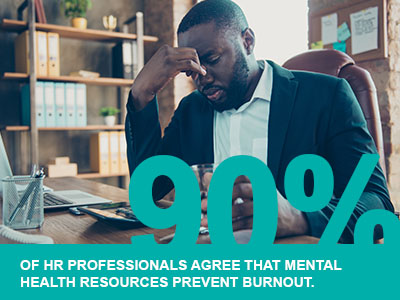 The workforce is currently facing an unprecedented amount of burnout, stress, and loneliness. SHRM and the SHRM Foundation have released Mental Health in America: A 2022 Workplace Report, which shows how HR policies can make an impact and create empathetic communities in the workplace.
The workforce is currently facing an unprecedented amount of burnout, stress, and loneliness. SHRM and the SHRM Foundation have released Mental Health in America: A 2022 Workplace Report, which shows how HR policies can make an impact and create empathetic communities in the workplace.
As the representative for the company's workers, HR professionals serve a vital role in assisting employees with mental health struggles and educating managers on how to best support their employees. 94% of respondents believe that mental health resources convey compassion, while 90% think that mental health resources can serve as a preventive measure for burnout before it appears.
"The importance of putting the mental wellness of our employees first cannot be underscored enough," said SHRM Foundation President Wendi Safstrom. "HR professionals, employers and people managers alike can play an important role in the lives of their employees by assisting them in finding the resources they need while simultaneously reducing stigma."
Employers leading the charge: Many organizations and HR professionals are setting the standard to improve mental health in the workplace. SHRM found that 78% of organizations offer mental health resources or plan to offer these benefits in the coming year. Additionally, 58% of HR professionals stated that in their view, their organization is providing sufficient mental health support to its workers.
Eliminating the stigma: With 4 out of 5 organizations offering mental health resources, 73% of organizations with such resources have an employee assistance program (EAP) in their benefits package, and 26% of organizations provide mental health workshops within the workplace. Additionally, 68% of respondents indicated the desire to include mental health and resiliency workshops in their work schedules.
Mental health preventive care: Simply offering mental health resources is not enough for organizations to stave off burnout and fatigue. They must also monitor their workforces proactively. Many organizations have implemented processes to measure efficacy in their workplaces to properly evaluate their employees' health. The top three forms of measurement include employee engagement surveys (48%), mental health resource utilization (47%), and productivity and attendance (43%). Low scores in employee engagement and productivity and attendance can be an indicator of employee burnout.
Other key findings include:
- 88% of HR professionals believe that offering mental health resources can increase productivity, while 78% said offering these resources can boost the organizational return on investment (ROI).
- 35% of workers believe mental health benefits are more important than higher pay or salary, and a similar percentage (29%) claimed that mental health perks like meditation or yoga matter more than higher pay.
- 58% of employees stated that a healthy work/life balance is more important than financial compensation.
- 41% of HR professionals believe that their organization does not offer enough mental health resources.
- 51% of U.S. workers agree that gaining access to more robust workplace resources would help improve their mental health.
- 86% of HR professionals indicate that offering mental health resources can increase retention.
- 72% of HR professionals believe that offering mental health resources can attract new talent.
Visit ASE’s Wellness Resources page for more resources on mental health and workplace burnout at https://www.aseonline.org/Data-Resources/Wellness-Resources.
Source: SHRM; CCH